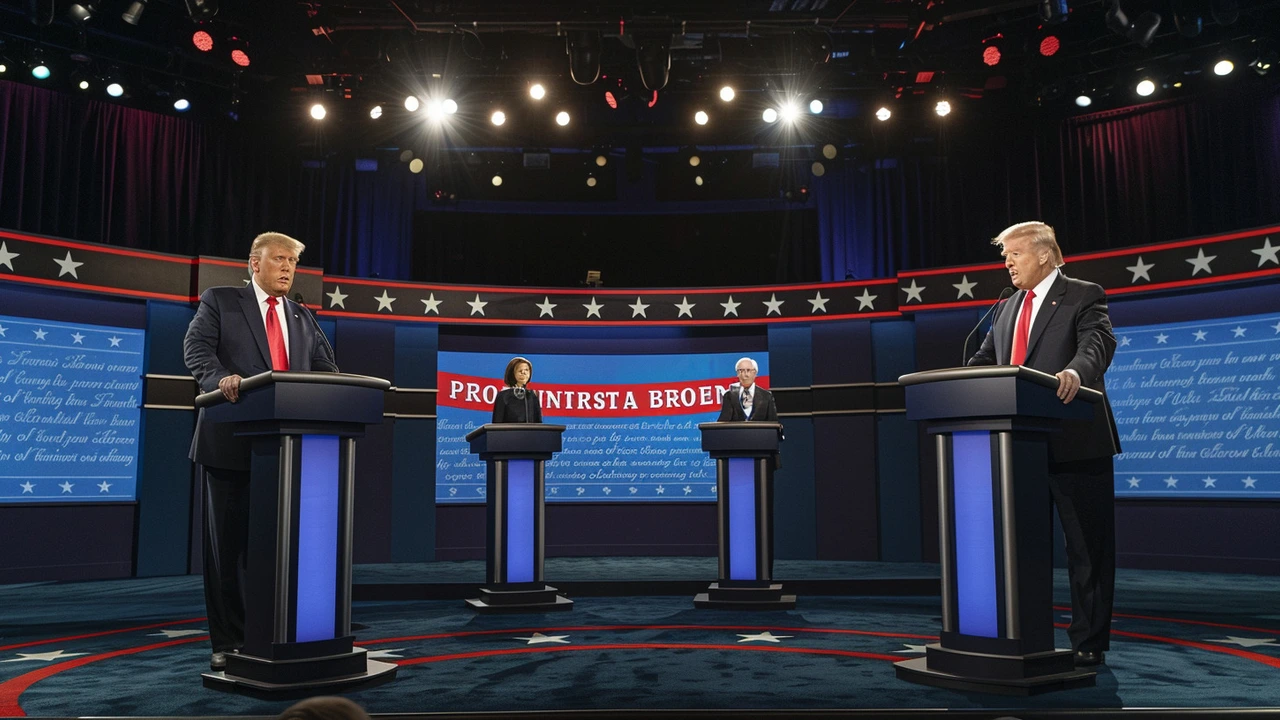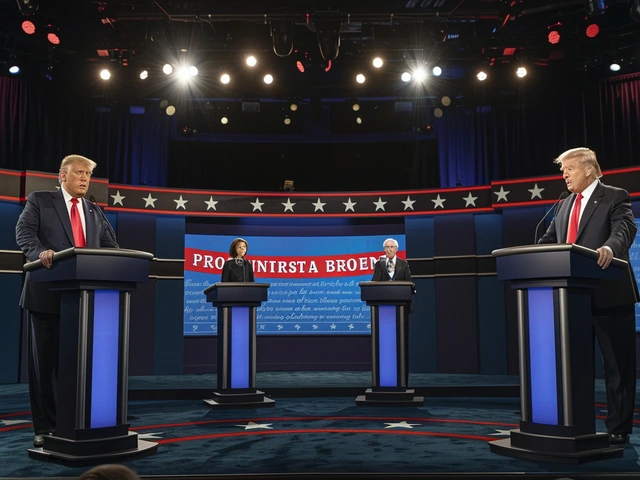Mounting Pressure on Biden Following Debate Missteps
The presidential debate between Joe Biden and Donald Trump has ignited intense scrutiny and a wave of criticism directed at Biden's performance. As debates go, this one was particularly pivotal, casting a spotlight on the significant chasms between both contenders. For Biden, the spotlight proved arduous, with his performance being dissected from multiple angles, leading to mounting calls for him to reconsider his candidacy for the presidency.
Trump's Fierce Attacks on Biden's Policies
During the debate, Trump went on the offensive, criticizing Biden's policies with claims that resonated strongly, albeit controversially, with certain segments of the electorate. One of Trump's primary targets was Biden's approach to the US-Mexico border, accusing him of allowing an influx of crime and drugs into American cities, an assertion that plays into longstanding cultural and political anxieties. Such statements, while alarmist, struck a chord with those concerned about national security and immigration.
Trump's rhetoric on immigration was neither new nor particularly nuanced, yet it underscored a narrative that has been a cornerstone of his political identity. He employed broad strokes to paint a dire picture of instability and lawlessness tied directly to Biden's tenure. Significantly, these points were made in a manner that demanded a strong counter-response, one that Biden struggled to deliver.
Biden's Unsteady Defense on Immigration
Biden's attempt to defend his policies, particularly his support for undocumented immigrants, was lackluster and left many unsatisfied. His explanations were marked by hesitations and a lack of a clear narrative on his broader strategies. This was particularly noticeable when Trump’s rhetorical flair demanded concise, impactful rebuttals. The complexity of immigration policy, with its myriad of intricacies, was unfortunately not conveyed with the precision and authority required for such a high-stakes exchange.
Throughout the debate, Biden’s difficulty in clearly presenting his accomplishments and responding effectively to Trump’s provocations was evident. His performance did little to sway the opinions of undecided voters or to reassure his supporters of his capability to face the relentless pace of a presidential campaign. The shadow of doubt cast over his debate skills came at a significant moment in the political calendar, just as voter perceptions begin to solidify.
Reaction from the New York Times and Other Media
The New York Times Editorial Board was particularly critical of Biden, describing his debate appearance as that of 'a shadow of a great public servant.' This characterization underscores a broader sentiment of disappointment, suggesting that Biden’s performance did not live up to the formidable reputation he has built over decades in public service. The board's call for Biden to step aside is a stark reflection of the gravity attributed to a single debate's performance in the campaign's grand scheme.
The Editorial Board’s perspective is significant, not only for its bluntness but also for its timing. With the presidential race heating up, their stance added fuel to the already blazing fire of criticism surrounding Biden’s campaign. It raises questions about his ability to withstand the rigors of the race and whether his continued presence is beneficial for the party’s prospects.
Obama's Perspective: A Calming Voice Amidst the Storm
Former President Barack Obama, however, has sought to temper the growing backlash against Biden. Remarking that 'bad debate nights happen,' Obama’s intervention aims to shift the narrative to one of understanding and perspective. He highlights that debate performances, while important, are not definitive measures of a candidate’s capability to lead.
Obama's comments serve to remind the public and pundits alike that debates are unpredictable by nature, often influenced by myriad factors beyond the candidates' control. He subtly points to the wealth of experience and service that Joe Biden brings to the table, something that cannot be overshadowed by a single subpar performance in a debate setting.
Impact on Biden's Campaign and Future Prospects
Despite Obama's efforts to mitigate the fallout, the debate performance has undeniably cast a long shadow over Biden's campaign. Discussion among political analysts and within Democratic circles now grapples with the practicalities and implications of Biden continuing in the presidential race. There is palpable concern that this debate blunder might have long-lasting repercussions, denting not just Biden’s image but also affecting the broader party’s chances.
The coming days are critical as Biden’s campaign reassesses its strategy. The need to project strength, clarity, and resolve is more pressing than ever. This moment demands not just damage control but a reinvigoration of his message to reconnect with his base and address the anxieties leveraged by Trump's attacks.
The Road Ahead: Challenges and Opportunities
Moving forward, Biden’s campaign faces the dual challenge of recalibrating its approach while fending off intensified scrutiny. The emphasis will likely shift to showcasing Biden’s policies and vision more compellingly, using platforms that allow for deeper, more controlled engagement with voters. In parallel, the campaign must prepare Biden for future debates, ensuring he is equipped with robust responses and a confident demeanor.
Moreover, the discourse around this debate has broader implications for how presidential candidates are evaluated and the weight given to debate performances. This episode highlights the crucial need for adept communication skills and the ability to convey complex policies succinctly and persuasively under pressure. For Biden, it is a stark reminder of the unforgiving nature of the political arena and the relentless demand for excellence at every turn.
In conclusion, the debate's aftermath has sparked serious discussions about Biden's candidacy and his capability to lead a successful campaign. While Obama and other supporters call for a measured perspective, the political landscape waits to see how Biden will navigate this challenge. The stakes are high, and the coming weeks will be pivotal in determining his trajectory in the race for the presidency.








Kaushal Skngh
June 29, 2024 AT 19:29Biden looks like he’s losing steam.
Harshit Gupta
July 1, 2024 AT 20:59The debate was a theatrical display that revealed Biden’s fading vitality!
Every stumble echoed the inevitable passage of time, a fact the electorate can no longer ignore!
America deserves a leader who can command the stage with razor‑sharp focus!
When Trump leapt at immigration, Biden wavered like a ship caught in a storm!
Such hesitation fuels the perception that his policies are mere whispers against the roar of reality!
The nation’s security hinges on decisive action, not on nostalgic recollections!
A president must project strength, not the frailty of a tired caretaker!
The media’s gloss over these fissures only delays the inevitable reckoning!
Voters are waking up to the fact that competence cannot be camouflaged by legacy!
The future demands a captain who can steer through turbulent waters without a wobble!
If the Democratic ticket clings to a relic, it risks capsizing the whole agenda!
The opposition will not hesitate to exploit any sign of weakness!
Every missed rebuttal is a chink in the armor that opponents will gladly pry open!
The party should consider fresh vigor to match the challenges of a changing world!
In the end, the American people will decide whether nostalgia outweighs performance!
HarDeep Randhawa
July 3, 2024 AT 22:29I’m telling you-Trump’s points, though blunt, expose the yawning gaps in Biden’s narrative!!!, and the public can’t afford to ignore such glaring contrasts, especially when policies drift like aimless clouds, over the horizon of reality!!!
Nivedita Shukla
July 5, 2024 AT 23:59In the theater of democracy, a single misstep can echo like a mournful hymn across the valleys of the collective conscience.
We stand at the crossroads where ambition meets humility, and the balance teeters on a whisper of doubt.
When a leader falters, the soul of the nation shudders, searching for a beacon amidst the fog.
Yet, perhaps this stumble is but a catalyst, urging a deeper reflection on what true leadership embodies.
Rahul Chavhan
July 8, 2024 AT 01:29Biden’s slip might cost him some votes.
Joseph Prakash
July 10, 2024 AT 02:59yes he needs fresh energy 😊
Arun 3D Creators
July 12, 2024 AT 04:29that debate was a real eye‑opener, man
RAVINDRA HARBALA
July 14, 2024 AT 05:59the data shows a clear dip in approval after this exchange; it’s a measurable trend that cannot be dismissed.
Vipul Kumar
July 16, 2024 AT 07:29It’s important to remember that a single debate doesn’t define a whole career; Biden has decades of experience that still matter, and the team can use this moment to refine their messaging and reconnect with voters.
Priyanka Ambardar
July 18, 2024 AT 08:59you’re romanticizing it too much 😒
sujaya selalu jaya
July 20, 2024 AT 10:29Debate performances are just one piece of the electoral puzzle.
Ranveer Tyagi
July 22, 2024 AT 11:59Exactly!!! The campaign should double‑down on policy successes, hammer home the achievements, and showcase clear plans!!! No room for hesitation!!!
Tejas Srivastava
July 24, 2024 AT 13:29What a spectacle! The arena turned into a circus, and the audience sensed the tension vibrating through every pause!!!
JAYESH DHUMAK
July 26, 2024 AT 14:59The recent debate underscores the critical importance of coherent policy articulation.
When candidates resort to rhetoric without substance, they undermine public trust.
Voters require clear, evidence‑based proposals that address pressing issues such as healthcare, climate change, and economic stability.
Moreover, the ability to respond succinctly under pressure is a hallmark of effective leadership.
Future forums should prioritize substantive discourse over theatrical posturing.
Santosh Sharma
July 28, 2024 AT 16:29Let’s focus on constructive strategies to boost voter engagement and clarify the campaign’s vision.
yatharth chandrakar
July 30, 2024 AT 17:59Indeed, a clear roadmap can alleviate concerns and reinforce confidence among supporters.
Vrushali Prabhu
August 1, 2024 AT 19:29i think the democrcats need to revamp their campign strategy, its time to bring fresh ideas !!!